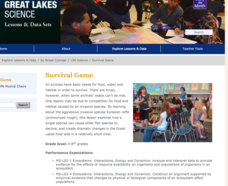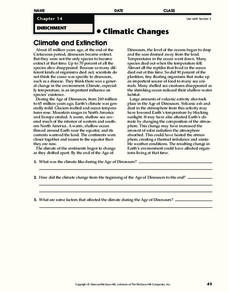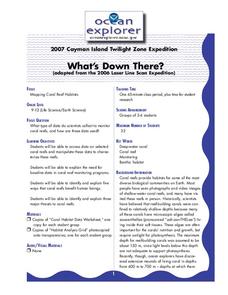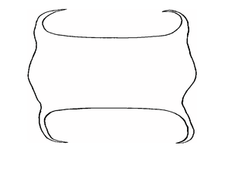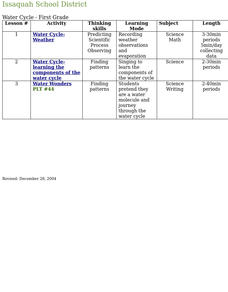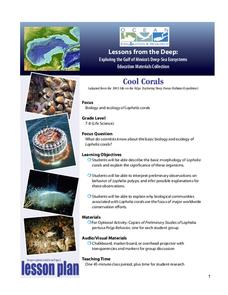Curated OER
Exploring Marine Ecosystems in the Caribbean and Maine
Students compare the marine habitats of Maine and the Caribbean using temperature, tides, ocean currents, latitude and longitude. In this marine ecosystems lesson, students analyze maps to complete graphic organizers that evaluate the...
Curated OER
Your Favorite Wild Animal
In this research skills worksheet, students select a wild animal and then respond to 5 short answer questions regarding it. In addition, students draw a picture of it and define 6 habitat terms.
Curated OER
Ring Detectives
Students describe the overall flow of the Gulf Stream, and explain how it affects biological communities in the North Atlantic Ocean.Students describe Gulf Stream rings, and explain how they are formed.Students be abl
Michigan Sea Grant
Survival Game
Musical chairs may be a classic game, but Ruffe Musical Chairs is a unique lesson on invasive species! Using the time-honored game, pupils role play the behaviors of the invasive fish called Eurasian ruffe. Learning about this aggressive...
Curated OER
Chewin' in the Chesapeake
High schoolers examine a web page on food webs and select a habitat to research. In this research lesson students identify the organisms found in the food web and present their findings to the class.
Curated OER
Adaptations
Students identify what adaptation is and to research a specific mollusk. They also identify and interpret how animals get their common and scientific name and why it is Latin. Finally, students draw their shell (mollusk) and name their...
Curated OER
Climatic Changes
In this weather worksheet, middle schoolers read an excerpt describing the climate and extinction. Then they explain what the climate was like during the Age of Dinosaurs. Students also determine some factors that affected the climate...
Curated OER
What's Down There?
Students analyze data on coral reefs and use this to help characterize reefs. In this mapping coral reefs lesson students identify and explain the major threats to coral reefs.
Curated OER
Bivalve Biology
Students place clams into a beaker containing saltwater. They place a small drop of food coloring just above the shell. Students observe the movement of the food coloring. Clams are then placed into clean beakers of saltwater with 24...
Curated OER
Seas Of Life
Students brainstorm examples of predator and prey that are featured in a video they watch. In this investigative lesson plan students will research an animal from the video and explain if it is a predator or prey and how it helps...
Curated OER
"Sea" Me Race
Third graders explore the ocean habitat. They race each other while portraying a different creature of the sea. They research various types of creatures found in the sea and portray that creature while racing classmate.
Curated OER
Skates
Students gain understanding of structure, characteristics, and basic needs of living things and their role in world, identify parts of skate, observe details of skate's body and skate egg case, and identify unique characteristics of skates.
Curated OER
Anchors Away
Students explore the unique world of the ocean community. They examine cloud formation, habitats and the food chain.
Curated OER
What is the Earth's Surface Like?
In this Earth's surface worksheet, students complete a graphic organizer by writing in 1 main idea and 4 supporting details describing the Earth's surface.
Curated OER
Faking It
Middle school earth scientists describe the behavior of the Coriolis force. They compare and contrast conditions under which the Coriolis force has a significant impact with conditions under which it has very little. They model the...
NOAA
Deep-Sea Ecosystems – Cool Corals
Young oceanographers research deep sea corals that thrive on chemosynthesis. The lesson focuses on the biology of the animal, preferred habitat, associations, and interactions.
NOAA
Biological Oceanographic Investigations – Through Robot Eyes
How can a robot measure the length of something when we don't know how far the camera is from the object? The lesson explains the concept of perspective and many others. Scholars apply this knowledge to judge the length of fish and the...
Curated OER
Wildlife
The centerpiece of this lesson plan is a predator-prey simulation in which colored paperclips represent different species of animals camouflaged against a colored background. Relevant follow-up questions are provided. The activity is...
Curated OER
This Old Tubeworm
Students plot data to construct and interpret a graph about vestimentiferans at cold-seep sites in the Gulf of Mexico. In this deep sea lesson, students plot data provided for the growth of tubeworms. They use the graphs to determine...
National Wildlife Federation
The Tide is High, but I’m Holding On… Using ICESat Data to Investigate Sea Level Rise
Based on the rate of melting observed from 2003-2007 in Greenland, it would take less than 10 minutes to fill the Dallas Cowboys' Stadium. The 17th activity in a series of 21 has scholars use the ICESat data to understand the ice mass...
American Museum of Natural History
What's the Big Deal About Water?
It may seem simple, but water is one of the most unique substances on Earth. An interactive online lesson describes its properties and importance in so many different situations. Learners interact with the lesson to learn the role water...
Curated OER
Cut-off Genes
Investigate the relationships between different deep-sea organisms by DNA sequencing. A worksheet provides instructions for DNA sequencing and space to work. They simulate gel electrophoresis by cutting out paper "DNA strands." Modeling...
Curated OER
Save a Reef!
Design a public information campaign to improve understanding of the coral reef crisis. Read about and discuss the biology and threats to the coral reef. The class creates a public information program about the problems facing the coral...
Curated OER
How Diverse is That?
Compare various types of biological diversity in a coral reef and calculate a numeric indicator that describes the diversity found in coral communities. Your class can work in groups to look at the abundance and distribution data of...
Other popular searches
- Deep Ocean Habitats
- Deep Ocean Habitats
- Ocean Habitats Year 2
- Science Ocean Habitats
- Ocean Habitats Math
- Ocean Habitats Producers
- Ocean Habitats Inquiry Based
- Ocean Habitats Inquiry
- Ocean Habitats Language Arts
- Powerpoint Ocean Habitats





